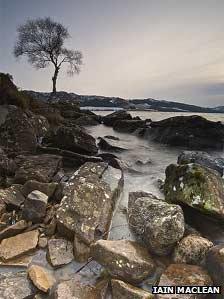Climate 'could alter' recreational activity in Scotland
- Published

Landscapes people enjoy could change markedly the report said
Warmer weather as a result of climate change could lead to more people doing outdoor pursuits, according to a report by Scottish Natural Heritage (SNH).
But some of the landscapes people seek to enjoy could change markedly over a short space of time as a result of increased rainfall and storms.
The report said forests, moors and peat bogs could be among habitats under the greatest pressure.
Trees in towns and cities could also be lost to extreme weather conditions.
The report, An assessment of the impacts of climate change on Scottish landscapes and their contribution to quality of life: Final report, has been published by SNH.
The public agency commissioned Land Use Consultants to carry out the research.
In the report's executive summary, external, the consultants have summed up the positive and negative impacts of warmer and drier summers.
'Fire risk'
They said: "Scotland could see an expansion in recreation activity, particularly in more accessible areas around settlements and in protected landscapes.
"Conversely, an increase in winter rainfall and reduction in snow lie could have an impact on winter recreation, reinforcing existing patterns of seasonality.
"These changes could result in pressure on accessible recreation facilities during the summer, with possible increases in erosion and fire risk, and pressure for tourism related development.
"There are also likely to be changes in people's outdoor experience reflecting the changing climate, increases in tourist numbers during the summer, and of course, the landscape and visual effects of all the other forms of climate related landscape change."
The report said warmer and wetter weather could change the shape of Scotland's rivers and coasts markedly, both through erosion and the construction of flood alleviation schemes.
Measures to counter climate change such as onshore and offshore renewable projects would also change landscapes, the report said.
The consultants said the effects of different weather conditions were not limited to the countryside.
Trees in towns and cities could be lost by being swamped by too much rain in winter, or through a lack of water during summer droughts.
Landmark historic trees could also be lost to storms.
- Published25 May 2011
- Published4 May 2011